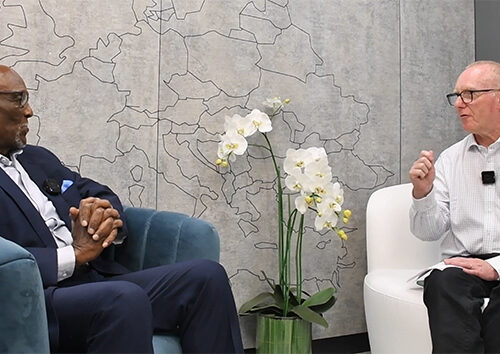11 March 2021 | Binfield, UK [Helen Pearson]
The March Diversity Lecture at Newbold College brought good news for aspiring women leaders. Early in the pandemic, anecdotal media reports suggested that women-leaders were more successful than their male counterparts. These reports were the spur for further research by Newbold’s March Diversity Lecturer, Professor Uma Kambhampati, Head of School in the Economics Department at the University of Reading.
She and a colleague scrutinised these suggestions more systematically. March 9th – the day after International Women’s Day – Kambhampati gave an account of their research, illustrating it with examples and current references, too many to include here.
The research began by looking at the best data available during the first quarter of the pandemic and asking if there was a significant and systematic difference in countries led by women when it came to the number of cases and the number of deaths. The researchers examined 194 countries and matched countries with male and female leaders who had similar socio-demographic and economic characteristics. Similar levels of population density, annual health expenditure per capita, tourist numbers, gender equality, population age – all were taken into consideration.
The result of their research during the first quarter of the pandemic, up to May 2020 revealed clear differences between female-led and male-led countries in both the case numbers and the numbers of deaths in the same period.
When they looked at possible reasons for the difference, they discovered that women-led countries took an early decision about the importance of protecting life and locked down earlier. Consequently, the women-led countries had fewer deaths in the first quarter of the pandemic.
But what about later on? They re-ran their research in the 3rd quarter of the pandemic when many countries were facing a ‘second wave’ of outbreaks. Still, the women-led countries were doing better.
‘Were women just more risk-averse?’ the professor asked. The answer seemed to be ‘yes’…in certain areas. Women were clearly more risk-averse when protecting human life. When it came to their countries’ economies, however, women leaders were less risk-averse than their male counterparts. Significantly, their economies fared better, largely because they had locked down earlier.
The researchers used insights from behavioural studies and leadership literature to explore the sources of the differences in leadership styles, as well as their implications. They explored the styles of language in speeches given by leaders. Their research yielded findings about gender differences unsurprising to those who have studied gender differences. Male leaders are more likely to engage in ‘transactional leadership’ with a task-oriented style based on processes and control, often avoiding action until things get critical. Female leaders, on the other hand, tend to adopt transformational leadership, warning of outcomes and informing, sharing information – exhibiting a more democratic and participative style and employing better communication skills.
Summing up, Professor Kambhampati, concluded that COVID-outcomes in the early stages of the pandemic were systematically and significantly better in countries led by women because they tended to adopt more pro-active policy responses. Even accounting for institutional context and other controls, female-led countries have been at an advantage in the current crisis.
Finally, Kambhampati, also examined the implications for her research for companies and public sector organisations, explaining that organisations which want to be sustainable, resilient and efficient could benefit from utilising both female and male leadership styles as the two genders bring to the table different experiences, responses and attitudes.
There were probably very few economists in the online audience for the lecture but there were a considerable number of people with an interest in gender and leadership in various contexts. Those interests were expressed in the Q&A session and Professor Kambhampati showed herself interested in exploring various expressions and aspects of women’s leadership outside the immediate realm of economics – in the church, in management training and mentoring, and in educational organisations.
The now-predictably global audience were appreciative. Anne-May Mueller from Denmark, who has four sons, wrote, ‘…I participated in the diversity lecture… I am still ‘high’ on the experience, and my poor boys had to sit for a mini lecture from me afterwards. (simly face) What a powerful, intelligent, relevant, and well-researched presentation. I loved it and I have several people on my mental list I will send it to.’
The full recording of the lecture can be viewed here.
tedNEWS Staff: Victor Hulbert, editor; Deana Stojković, associate editor
119 St Peter’s Street, St Albans, Herts, AL1 3EY, England
E-mail: [email protected]
Website: www.ted.adventist.org
tedNEWS is an information bulletin issued by the communication department of the Seventh-day Adventist Church in the Trans-European Division. Readers are free to republish or share this article with appropriate credit including an active hyperlink to the original article.



